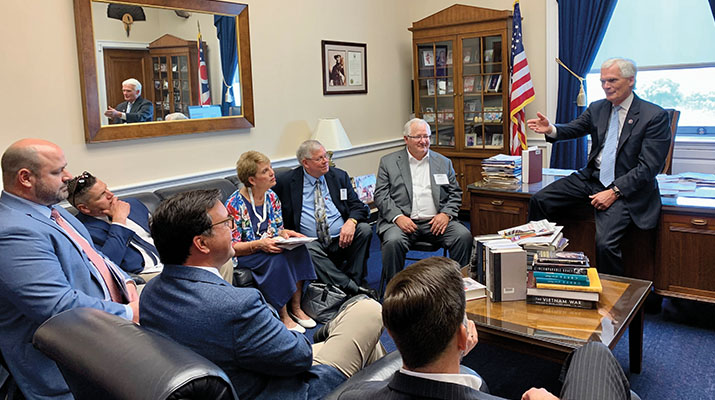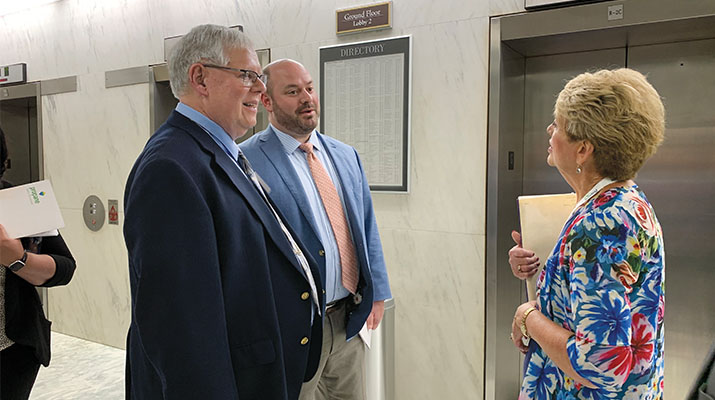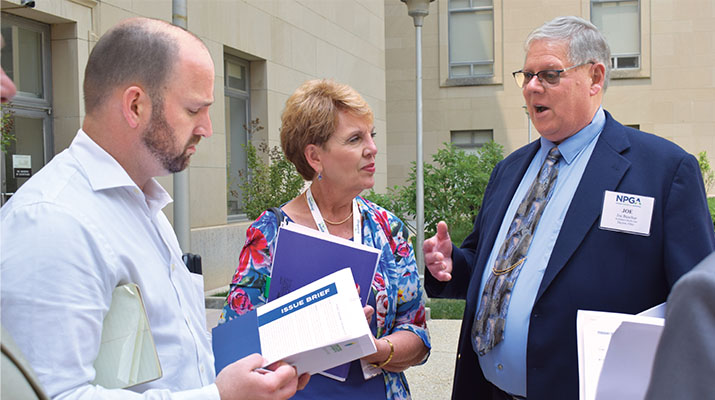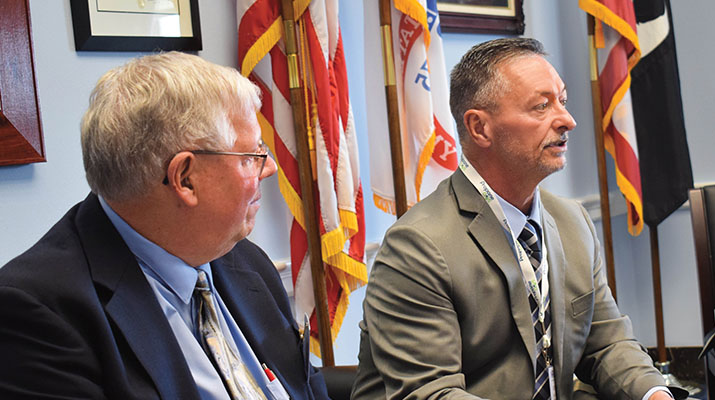Propane Days returns to congressional offices for in-person meetings
“Tell them who you are. Tell them what you do.”
Michael Baker offered a simple directive to propane industry members preparing for congressional meetings on Capitol Hill.

Rep. Bob Latta, R-Ohio, right, meets with propane industry members during Propane Days. (Photo by LP Gas staff)
The National Propane Gas Association’s (NPGA) Propane Days advocacy event in Washington, D.C., finally had a familiar feel with a return to in-person meetings for the first time since 2019. The COVID-19 pandemic had closed office doors and changed the way Congress communicated with the public, so reminders and helpful tips from association leaders like Baker, vice president of federal legislative affairs at NPGA, held more weight this year.
One of the first points of emphasis in preparing for the sessions: Clear-cut introductions to legislators or congressional staffers can kick-start a successful meeting.
“Your job is to be a business owner, an employee of a business from a certain state or congressional district, going in and talking about how that business impacts the constituents of that district or that state and how you impact the community,” Baker explains.
“The propane industry has been keeping folks warm every winter, every Christmas,” he uses as an example. “These are good stories to tell – and that’s going to these legislators and being able to tell it face to face.”
Industry issues change
When the industry last gathered in the nation’s capital for in-person meetings in 2019, the issues were much different. NPGA had prioritized alternative fuel tax credits, alternative fueling station locations along highways, attracting more employees to the transportation industry, carbon labeling of consumer appliances, and the regulations and restrictions of the maritime-based Jones Act.
NPGA’s step-by-step guide to a successful meeting instructs industry members to identify the current issues for congressional leaders following introductions. This year, the industry covered a lot of ground – from issue briefs about protecting consumer access to propane, to ensuring propane’s inclusion in several federal program authorizations.

Michael Baker, center, accompanies Joe and Rosie Buschur of Ohio to meetings with their representatives. (Photo by LP Gas staff)
“We’ve had a lot of support from Congress in supporting energy choice,” Baker says. “That’s a top issue for us this year.”
Meanwhile, two issues discussed at Propane Days addressed supply and pricing into the future. Propane industry members shared information about the farm bill and the Department of Homeland Security’s (DHS) Chemical Facility Anti-Terrorism Standards (CFATS) program with legislators.
NPGA says regulatory decisions and inflation have limited the ability of agriculture producers and rural communities to increase on-site propane storage. So, when a harvest is wet or late, propane consumption increases – sometimes dramatically – which can lead many propane retailers undersupplied. This occurred during the harvest and winter of 2013-14 when propane retailers combined to sell 300 million gallons of propane to meet grain drying demand – 235 million more than the previous year, according to NPGA.
Eliminating storage barriers, increasing collaboration and incentivizing increased storage will benefit downstream impacts for agriculture producers and rural America by putting more propane gallons into their communities, the industry explained to legislators at Propane Days.
“We’re looking for ways that we can address that through the farm bill,” says Andrew Healey, senior manager of legislative affairs at NPGA. The current bill expires Sept. 30.
NPGA is seeking in the farm bill a retail agriculture CFATS exemption for propane.
In 2006, Congress authorized DHS to establish CFATS, a program managed by the Cybersecurity and Infrastructure Security Agency that identifies and regulates high-risk chemical facilities to reduce the risk of certain hazardous chemicals being weaponized.
A retail agriculture CFATS exemption for propane would address the “arbitrary ceiling on the amount of propane any agriculture producer, household or retailer can store,” set at 60,000 pounds or about 14,200 gallons, without being subject to onerous reporting requirements, NPGA says. DHS granted agriculture facilities exemptions from CFATS for products used in preparation for the treatment of crops, feed, land, livestock and other areas of an agricultural production facility – but does not include fuel or propane used for heating.

Incentivizing propane storage for agriculture producers and rural communities was a key discussion point. (Photo by LP Gas staff)
Propane is also left out of the Farm Storage Facility Loan Program, which provides financing to grain producers to build or upgrade commodity storage facilities. NPGA is asking Congress in the next farm bill to help codify propane’s inclusion in the loan program, as 80 percent of grain dryers run on propane.
NPGA addresses CFATS directly in a second issue brief, as the program is up for reauthorization this year. Propane is one of over 340 substances on the chemical-of-interest list, though the association argues that it’s a fuel better described as a “community commodity” than a chemical and is already subject to security measures in other state and federal regulations.
Having CFATS establish a ceiling for propane storage ultimately raises consumer prices and limits supply during times of peak consumption, NPGA says. Therefore, it adds, Congress should exempt propane used as a heating fuel or held for direct sale at a retail facility from the CFATS program.
“This relatively new regulatory scheme does not make propane any safer than what it was in 2006. Propane is a clean and safe fuel today,” Healey says. “All CFATS does is provide an extra layer of red tape to our industry that ultimately impacts consumer pricing.”
Latest on the issues
Propane Days 2023 earned the distinction of having legislation under consideration at the same time industry members addressed the issue with congressional leaders: protecting consumer access to propane and other conventionally fueled appliances, including gas stoves, furnaces and water heaters.
A week after Propane Days, the industry hailed the passage of two House bills aiming to protect consumer access to gas stoves: the Save Our Gas Stoves Act (HR 1640) and the Gas Stove Protection and Freedom Act (HR 1615). The bills counter the “systematic steps” taken on multiple occasions by the Department of Energy and the Consumer Product Safety Commission “to limit the availability of consumer products,” according to NPGA. Both bills now head to the Senate for consideration.

Propane retailers expressed their support for consumer choice to lawmakers. (Photo by LP Gas staff)
NPGA worked closely with Rep. Debbie Lesko, R-Ariz., who introduced HR 1640. She spoke to their collaboration on the House floor.
“I want to thank the National Propane Gas Association for their support of my bill and for their support for American consumer choice,” she says.
Several of this year’s issues revealed legislative opportunities for propane in federal appropriations or program authorizations. NPGA submitted appropriations requests – for the investment of propane technologies – for fiscal year 2024 in the areas of renewable propane, propane vehicles and the use of dimethyl ether, as well as for micro-CHP systems and microgrid technology. NPGA says it has secured more than $20 million in Department of Energy research and development funding for certain propane technologies since 2019.
Similarly, NPGA is pursuing provisions in the National Defense Authorization Act – specifically pilot programs for propane-fueled vehicles and generators at Department of Defense facilities – and in the Federal Aviation Administration reauthorization, particularly for propane’s use in vehicles and generators at airports.
Topics of discussion
The issues that propane industry members discussed with congressional leaders during this year’s Propane Days meetings on Capitol Hill:
- Protecting consumer access to propane.
- Including propane in federal appropriations.
- Supporting propane in the farm bill.
- Chemical Facility Anti-Terrorism Standards program reauthorization considerations for propane.
- National Defense Authorization Act.
- Federal Aviation Administration reauthorization.
Propane Days by the numbers
During Propane Days, NPGA members from 40 states met with more than 200 congressional offices.
More than 465 people attended the NPGA’s barbecue reception in the Rayburn cafeteria, part of the Rayburn House office building, including 15 members of Congress and more than 250 congressional staffers.
State snapshot
A shift in leadership is taking place at the Ohio Propane Gas Association as Frank Edwards of Coles Energy assumes the state director role that Joe Buschur of McMahan’s Bottle Gas has held for nearly 16 years.

Frank Edwards of Coles Energy is Ohio’s next state director, replacing Joe Buschur. (Photo by LP Gas staff)
Joe and Rosie Buschur have attended advocacy events at the state and national levels consistently during that time.
“It’s a great event,” Joe Buschur says of Propane Days. “Sometimes something totally unexpected happens. With Bob Latta, we left some information in his office. He came down to the reception afterwards, and from there we developed a relationship that really paid off.”
Edwards says the Buschurs have been like parental figures to him, and they will make sure he has the tools and resources needed to carry forward the state’s high level of leadership.
“To me, they’re like the first family of propane,” Edwards says. “The 21 years that I’ve been blessed to be in this business they were the ones I looked up to. They were the ones who have put their entire life toward propane; their business is propane; they raised their kids through propane. They’re the ones who have taken time out of their business and the money out of their business to come to Washington and speak and push propane. They take time to go to Columbus and speak about propane. They’re not ones who just say it; they do it; they back it up.”
















